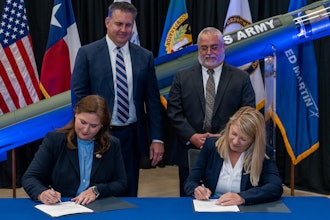Most workers believe the safety culture at the U.S. Department of Energy's most expensive and most complex nuclear waste treatment plant is strong, but some worry they will face retaliation for raising concerns, according to a report this week.
The Energy Department surveyed workers at the Waste Treatment and Immobilization Plant, which is under construction on the Hanford nuclear reservation near Richland, Wash., to learn if they feel comfortable pointing out safety concerns to superiors.
Most of those surveyed believed the safety culture was strong and improving, the report said. But some workers at private contractor Bechtel National, Inc., and its subcontractors felt differently.
"Some individuals within WTP believe that there is a chilled environment that discourages reporting of safety concerns," the report said, adding some workers are worried they will be retaliated against if they raise safety issues.
Bechtel National officials did not immediately answer a call for comment. The company had previously said it had already decided to strengthen its nuclear safety culture before the review.
The $12 billion plant is intended to convert the most dangerous wastes left over from production of nuclear weapons into a glasslike substance for storage. Hanford contains the nation's largest volume of Cold War era nuclear waste, and much of it is stored in aging underground tanks.
The huge WTP plant is the Energy Department's largest construction project, and workers have been building it for more than a decade.
The safety culture came into question when Walter Tamosaitis, former research manager for the plant, was released from the project without warning in July after he said he raised 50 safety concerns Bechtel National officials. Tamosaitis was employed by Bechtel National subcontractor URS.
As a result, the Energy Department's Office of Health, Safety and Security surveyed workers in August and September.
Workers who expressed concerns were most worried about subtle retaliation, such as not getting selected for new assignments as their current tasks ended, the report said.
Some people, including senior staff and managers, said the Tamosaitis situation contributed to a chilling effect that may reduce their willingness to raise technical and safety issues, the review said.
Some workers complained that some managers talked safety, but then discouraged them from writing reports in which safety issues were raised unless those reports were cleared with management first, the review said.
Others complained that managers and company lawyers attempted to change issued documents to put the company in a more favorable light, the review said.
"Most WTP personnel who were interviewed expressed that their managers encouraged a questioning attitude and that they were comfortable with raising safety concerns," the report said.
The report recommended that Bechtel make some changes, including that managers take steps to ensure that investigation of safety issues includes root causes; that safety programs are not hurt by changes in project status; and that they examine all credible concerns.
The Department of Energy and Bechtel National have begun to prepare for the transition from design and construction to construction and commissioning the plant for operation in 2019.


















